- Home
- Warwick Deeping
No Hero-This
No Hero-This Read online
* A Distributed Proofreaders Canada eBook *
This eBook is made available at no cost and with very few restrictions. These restrictions apply only if (1) you make a change in the eBook (other than alteration for different display devices), or (2) you are making commercial use of the eBook. If either of these conditions applies, please contact a https://www.fadedpage.com administrator before proceeding. Thousands more FREE eBooks are available at https://www.fadedpage.com.
This work is in the Canadian public domain, but may be under copyright in some countries. If you live outside Canada, check your country's copyright laws. IF THE BOOK IS UNDER COPYRIGHT IN YOUR COUNTRY, DO NOT DOWNLOAD OR REDISTRIBUTE THIS FILE.
Title: No Hero—This
Date of first publication: 1936
Author: Warwick Deeping (1877-1950)
Date first posted: Feb. 24, 2019
Date last updated: Feb. 24, 2019
Faded Page eBook #20190244
This eBook was produced by: Mardi Desjardins, Al Haines, Jen Haines & the online Distributed Proofreaders Canada team at https://www.pgdpcanada.net
BOOKS BY THE SAME AUTHOR
Sackcloth Into Silk
Two in a Train
The Man on the White Horse
Seven Men Came Back
Two Black Sheep
Smith
Old Wine and New
The Road
Short Stories
Exiles
Roper’s Row
Old Pybus
Kitty
Doomsday
Sorrell and Son
Suvla John
Three Rooms
The Secret Sanctuary
Orchards
Lantern Lane
Second Youth
Countess Glika
Unrest
The Pride of Eve
The King Behind the King
The House of Spies
Sincerity
Fox Farm
Bess of the Woods
The Red Saint
The Slanderers
The Return of the Petticoat
A Woman’s War
Valour
Bertrand of Brittany
Uther and Igraine
The House of Adventure
The Prophetic Marriage
Apples of Gold
The Lame Englishman
Marriage by Conquest
Joan of the Tower
Martin Valliant
The Rust of Rome
The White Gate
The Seven Streams
Mad Barbara
Love Among the Ruins
NO HERO—THIS
By
WARWICK DEEPING
McCLELLAND & STEWART, LIMITED
PUBLISHERS TORONTO
COPYRIGHT, CANADA, 1936
BY
McCLELLAND & STEWART, LIMITED
TORONTO
PRINTED IN CANADA
————————
T. H. BEST PRINTING CO., LIMITED
TORONTO, ONT.
AUTHOR’S NOTE
In a human record such as this, in which characters having some shadow of reality are mingled with those which are wholly imaginary, an author must feel profoundly responsible for the memories of others.
Therefore, it seems necessary to confess that such characters as Colonel Cleek and Lt.-Colonel Skinders and Captain Carless are pure creations.
There were Cleeks and Skinderses in the War, but in this record they are types who serve to emphasize the maleficent influence that can be exercised by such men in authority. It is the kind of authority which can make war-service so shabby and shameful a business, coercion of the good by personalities crudely and meanly selfish.
Colonels Frost and Fairfax are the more happy and familiar figures to us all, men of courage and of magnanimity who helped other men to transcend their fear.
NO HERO—THIS
Let me try to be truthful in this journal, and observe and describe myself and others as a clinician is taught to describe a case in a hospital ward. That the ego is prejudiced in its own favour is a platitude, and patriotism may be the massed prejudices of communal egos, self-interest tinged with emotion.
* * *
The little world in which I work has become saturated with emotion.
* * *
I hear a brass band playing a march, and I tell myself that my soul should strut and swagger, but somehow it refuses to fall in and follow the band.
* * *
I am a country doctor, aged thirty-five, in partnership with a man of fifty-three, whose kindness and wisdom have made me more than respect him. I am married. My marriage has been a happy one, and perhaps I have been tempted to be sentimental about it. Mary and I have always understood each other, perhaps because the problems we have had to face have been simple and actual. As yet we have no children. We had decided to wait for a time before having children. I suppose I am a somewhat unadventurous person. My work in this corner of Sussex has satisfied me.
I do not want to go to the War.
Let me be honest about it. What is it that makes me shrink? Fear, yes, some fear, but of what? A doctor may never pass into the danger zone. On the other hand he may be with a battalion in the trenches. Fear of what? Death, mutilation, or of a strange new anonymous life full of alien faces, a kind of going back to school like some raw but sensitive child? Am I so old at thirty-five that I fear change, insecurity, the stripping of one’s comfortable self on the edge of this sinister, dark sea? I am a somewhat separative creature. I cannot laugh easily, and smack shoulders, and lay my head on the breezy world’s buxom bosom. I am apt to become mute in a crowded room, and to retreat into a corner.
* * *
Mary says nothing.
* * *
I often wonder what the secret Mary thinks about the war. I am beginning to realize that this blinding universal rage has brought a kind of silence between us. We talk the conventional stuff about Belgium and Ypres, and the Russian Steamroller, and the Miracle of the Marne, and of the heroism of our men in Flanders, but I notice that we both shrink from intimate personal confessions. I seem to be divining some other and essentially secret creature in my wife.
We saw Roger off last night at the station. A dead, December dusk, a few gas jets glazed and solitary. His people did not come, which I understood. Roger is thirty-eight, and an old volunteer. He goes to an infantry battalion somewhere in Dorsetshire. Roger very quiet, but with a look in his eyes that hurt me. We stood there fidgeting in a kind of dreadful silence, waiting for his train to come in. I felt that he was yearning for that train to arrive. So was I.
Afterwards, in the car, Mary said to me, “I feel that he won’t come back.”
I tried to be cheerful, and she added, “And Roger knows it.”
I had nothing to say.
* * *
Surgery. Warmth and lights, the familiar odour of drugs, the rows of bottles like friendly faces. Randall, my partner, has gone to bed with one of his attacks of migraine, and all the work is mine. I am glad of it, for it seems to safeguard something in myself, and to justify my being here. The waiting-room is full. It has been raining, and the stuffy room smells of warm, damp clothes. I have little Freddie Lavender in with his mother, a nasty compound fracture of the bones of the forearm. My case and doing excellently. I am pleased. Old Bannister up with his eternal cough. He has a nasty habit of coughing in one’s face. Dispense medicines, and wrap up and seal bottles. The smell of the hot wax is curiously reassuring.
Write up books and records. Wash out measuring glasses. I notice that I have dropped some sealing wax on the dispensing counter which is brown and stained with use and age. Clean it off with a spatula. Randall is apt to be fussy about small thin
gs, and completely serene when the big things come along.
* * *
I go out into Brackenhurst High Street. My home is a little Georgian house beyond the church. It has a white door and a graceful fanlight. There is a smell of cooking as I open the door. This perfume from the kitchen is always a delicate offence to Mary, but to me it is somehow homely and pleasant, especially on a dead, December night. Steak and onions, and a raspberry tart. The boy in me is active. Mary rather silent.
We sit by the fire. There are oak logs on it. I have a book and a pipe. Our drawing-room looks out on the long garden with its low hedges and high walls. In this room it is very silent at night, save when a wind is blowing. No footsteps, no sound of traffic. Mary has a book, but I notice that she keeps putting the book down in her lap to stare at the fire. Her face has a kind of tense, inward stillness. I wonder, and am vaguely uneasy.
Suddenly, she looks at me almost like a stranger; it is only for a moment. Her eyes are back gazing at the fire.
She tells me that she has been with Roger’s wife, and helping to bath the children. I ask about Norah, and am puzzled at the way she eludes my question. Why doesn’t she want to talk about Norah? Roger’s wife is a particularly transparent and happy person, so bright and sane, not the sort of woman to dissolve into emotion. I am sure that Norah has been utterly brave. Mary says something about sacrifice. Sacrifice? A kind of embarrassment seems to stumble in between us. I find that my pipe has gone out. I relight it. Mary picks up her book and goes on reading. A wind seems to spring up from nowhere, and I hear it making a little restless moaning in the chimney.
* * *
A sunny day, one of those rare days in winter when the air is like iced hock. But I remember that hock is a German wine, and therefore undrinkable. I am driving to Thornhill Place to see Lady Hazzard about the fitting up of Thornhill as an auxiliary hospital. Both the sky and the woods are wonderful, the Scotch firs red-throated and intensely and darkly green. Even in winter the pointed buds on the great beech trees shine like spicules of pale gold. The wet bracken is almost red. I can see the Downs in the distance like grey smoke. This damned war seems to make one more sensuously alive to beauty, but it is a beauty that hurts. I find Lady Hazzard rather like a tall, thin figure in ivory, distant and delicate, with enigmatic, ice blue eyes. She tells me that Layton of St. Helen’s is to take charge of the surgical cases, and that he will drive over daily. I feel snubbed and wonder if her Lady Superior’s air is fortuitous or wilful.
* * *
We have a Kitchener battalion billeted in the town. The men come mainly from some industrial area in the Midlands. One company is in khaki, the rest in dark blue suits and Glengarry caps. I saw them coming in from a route march this morning, and the business depressed me. The physique is very poor, and in some cases grotesque. Many of the men were very done. Poor thin, straining necks, and little pinched faces. A strapping second lieutenant swinging along at the rear of a company looked to me to be about the only man with a straight back and squared shoulders.
* * *
As I came out of The George after seeing the lessee, who is in bed with bronchitis, I found the battalion paraded on the Abbey Green. Half the town looking on. I fall in with the Misses Ponsonby, large, handsome young women in tailor-made tweeds and hard hats. These young women remind me of supercilious, aristocratic horses. They have been very active in all patriotic alarums and excursions. The Ponsonby family dominate the town socially. Two brothers are in the Guards, good-looking young men with small heads and very pale blue eyes. I take off my hat to the Misses Ponsonby, and pause by them. They look at me in a queer, oblique way, and I notice that both of them seem to have deeply cut nostrils.
Honoria says to her sister, “I hear this battalion hasn’t yet got a medical officer. It’s a perfect scandal.”
I dare to correct Miss Ponsonby. The battalion has a medical officer, a little Glasgow man rather like a gruff and self-satisfied Scotch terrier. He called on me yesterday in khaki, and was so conscious of it that I found him rather offensive.
Miss Ponsonby gives me another oblique look. Both of them are very head in air. I hear her say to her sister, “I’m glad someone has a sense of duty.”
* * *
I edge away, feeling hot about the ears. Duty! I can almost see those handsome wenches taking men by the collar and marching them to the recruiting station. But I am to have an uncomfortable morning. I run into Rob Guthrie at the corner of Mont Street. Guthrie is an histrionic person who wears large hats and a flamboyant manner, the amateur country gentleman in clothes and colour. He is aged about fifty, possesses one of those brown-bread faces and a drooping moustache. He has an offensive breath and, as I happen to know, it is the breath of alcoholic dyspepsia. Guthrie cocks his head at me and stops. He is the sort of man who makes emotional and bathotic speeches at political meetings.
He says, “Doesn’t that thrill you, Brent?”
He points with his stick down the street.
“Lads who are not afraid of the muck and the shells. It is hell in Flanders.”
I say that things are not so bad as all that, and that the Germans are held.
He tells me that he has volunteered to drive an ambulance in France. I want to say that I am sorry for the ambulance. He goes on to assert that if the young men don’t go, others who are older, but who have more guts, will have to fill the ranks.
Piqued, I retort that many of the men who are going will not be in at the death.
“The Germans have shot their bolt.”
He looks at me with his little red eyes and says, “Bosh!”
I walk on, realizing that he had considered it to be his duty to be offensive to me. If all the Guthries in the world were twenty years younger there might be less of this rage for pushing other people into a kind of bottomless pit. Guthrie is so safe. Neither in age nor in physique is he fit for anything but to strut about and hector the young. It makes me angry that I should be admonished by Guthrie, a man whom I despise. I have work to do; I have to control my appetites and my temper, and yet I can be shot at by this sot.
I wish this winter would pass. To me it is a dead and dreadful winter, full of a feeling of strangeness and suspense. I go about like a man troubled by perpetual qualms, and as though nothing would digest itself sweetly inside me. All the familiar things, places and faces, seem to become mistrustful and unfriendly. One’s impressions of life seem distorted as in a cracked mirror.
People talk of nothing but the war. I hear of men who have gone, and even more so of men who have not. This crowd complex makes people cruel.
German atrocities! I wonder about them. On one occasion in public I dared to question the evidence, and there was a kind of shocked and hostile silence.
Mary is so much more silent than she used to be.
* * *
There are wounded at Thornhill. I go there to look round the wards and to give anæsthetics for Layton. These wounded men who have suffered are so much more human than the people at home. The one thing that hurts me most is their cheerfulness. I question it, and should like to question them. Can they smile because they hope that they will not have to go back? Or do they think that they have to play up to all these women?
But they do not look at me coldly with eyes of reproach. They have faced the ultimate horror of the great reality, and perhaps they know in their vitals what is the truth.
* * *
Lady Hazzard said to me rather frigidly this morning, “We are very glad to have your services, Dr. Brent, until we can arrange for an older man to help Dr. Randall with the wards.”
* * *
Randall is in charge of the wards. There seems to have been some mutual and private arrangement about this, but Randall has said nothing to me about it. After all, I am thirty-five and married, and not particularly robust, and I am working ten hours a day. I suppose that if I was functioning in some urban area my work would be justified, but here in this country community there are so many people w
ho seem to consider it their duty to make one feel naked and ashamed. This little town has the atmosphere of one of those ridiculous but disconcerting dreams in which you find yourself dining with the Ponsonbys in nothing but your shirt.
And the Ponsonby women would not even leave you your shirt.
* * *
Something has upset Mary. I was in early for tea, and sitting in front of the fire with the lights out, waiting for her. She came into the room, and I saw her reflection darkly in the long mirror. She stood a moment, quite still, staring at nothing. She had not realized my presence. I sat up in the chair, and she gave a kind of gasping cry.
“I didn’t know you were here.”
Vague anger and resentment! But why? She turned on the lights, took off her hat and coat, and rang for tea. Her face looked cold, and the weather was not cold.
I asked her where she had been, and she answered rather curtly, “O, to the Red Cross working-party.”
I felt that she did not want to be questioned. Has some good woman been hinting that I ought to be in khaki?
* * *
Randall and I are in the surgery together, he at the desk writing up the day-book, I at the sink washing out a medicine bottle. I have the feeling that someone is watching me. I turn and meet Randall’s eyes. Our consciousnesses seem to cross for a moment like a couple of swords. Randall looks suddenly uncomfortable, and resumes his scribbling. I can hear the surgery clock ticking.
“O, Stephen.”
I stand holding the bottle.
“I have been meaning to speak to you about something. It isn’t my business, and yet, in a sense, it is ours. Besides, in a way, being the senior——”

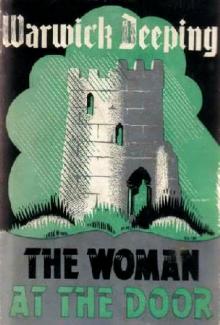 The Woman at The Door
The Woman at The Door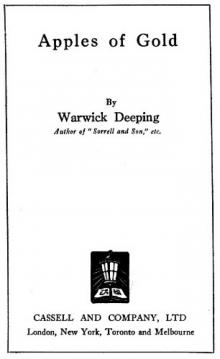 Apples of Gold
Apples of Gold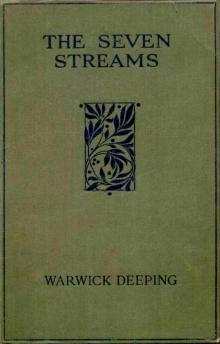 The Seven Streams
The Seven Streams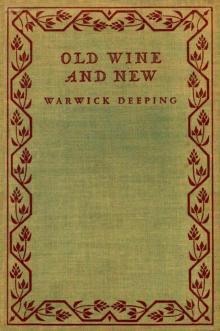 Old Wine and New
Old Wine and New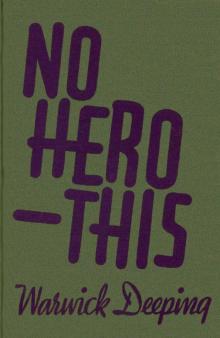 No Hero-This
No Hero-This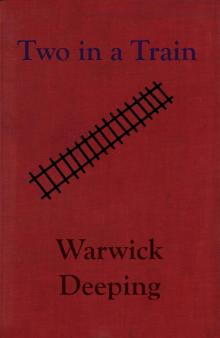 Two in a Train
Two in a Train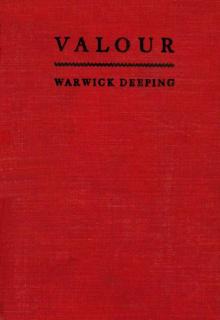 Valour
Valour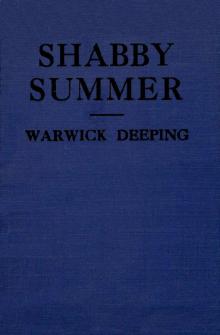 Shabby Summer
Shabby Summer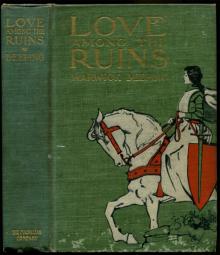 Love Among the Ruins
Love Among the Ruins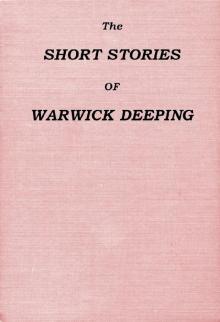 The Short Stories of Warwick Deeping
The Short Stories of Warwick Deeping